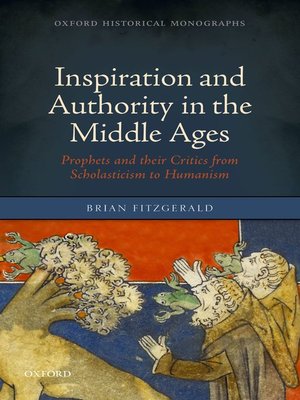Inspiration and Authority in the Middle Ages
ebook ∣ Prophets and their Critics from Scholasticism to Humanism · Oxford Historical Monographs
By Brian Fitzgerald

Sign up to save your library
With an OverDrive account, you can save your favorite libraries for at-a-glance information about availability. Find out more about OverDrive accounts.
Find this title in Libby, the library reading app by OverDrive.



Search for a digital library with this title
Title found at these libraries:
| Loading... |
Inspiration and Authority in the Middle Ages rethinks the role of prophecy in the Middle Ages by examining how professional theologians responded to new assertions of divine inspiration. Drawing on fresh archival research and detailed study of unpublished manuscript sources from the twelfth to fourteenth centuries, this volume argues that the task of defining prophetic authority became a crucial intellectual and cultural enterprise as university-trained theologians confronted prophetic claims from lay mystics, radical Franciscans, and other unprecedented visionaries. In the process, these theologians redescribed their own activities as prophetic by locating inspiration not in special predictions or ecstatic visions but in natural forms of understanding and in the daily work of ecclesiastical teaching and ministry. Instead of containing the spread of prophetic privilege, however, scholastic assessments of prophecy from Peter Lombard and Thomas Aquinas to Peter John Olivi and Nicholas Trevet opened space for claims of divine insight to proliferate beyond the control of theologians. By the turn of the fourteenth century, secular Italian humanists could lay claim to prophetic authority on the basis of their intellectual powers and literary practices. From Hugh of St Victor to Albertino Mussato, reflections on and debates over prophecy reveal medieval clerics, scholars, and reformers reshaping the contours of religious authority, the boundaries of sanctity and sacred texts, and the relationship of tradition to the new voices of the Late Middle Ages.






